People of Asian heritage have been part of communities in North America for centuries – since before the American Revolution.
In honor of Asian American and Pacific Islander Heritage Month, we asked five industry leaders of Asian descent to share challenges they’ve faced, as well as particular skills or perspectives from their heritage that have helped them succeed and advice for the next generation in promo.
Challenges Both Personal And Professional
Asian Americans have faced discrimination in various forms, from Chinese immigrants working on the Transcontinental Railroad to the internment of Japanese Americans during World War II to more recent racist attacks during the COVID pandemic.
Cindy Tsuji, a senior account executive with Washington-based distributor Image Source, has a direct family connection to one of these ugly chapters in American history.
“My father (a U.S. citizen) and his family were interned in a camp in Poston, Arizona, during the war, and he served in the U.S. Army after internment,” she says. “… He never spoke of his experience until I interviewed him in college. He had anger and fear this could happen again to his kids. He wanted us to rise above the racism, do better and be kind.”
Tsuji, who previously chaired PPAI’s DEI Task Force, says the murder of George Floyd in 2020 prompted her to speak out about the importance of inclusion.
“Finding my voice in the DEI space challenged me to lead outside of my comfort zone,” she says. “It gave me anxiety and amplified feelings of imposter syndrome. The work as a volunteer can be exhausting and sad as we try to find space to be kind to each other as human beings. Learning to create boundaries to protect mental health and wellness is so important. Our industry still has a way to go in wrapping our arms around uncomfortable conversations.”
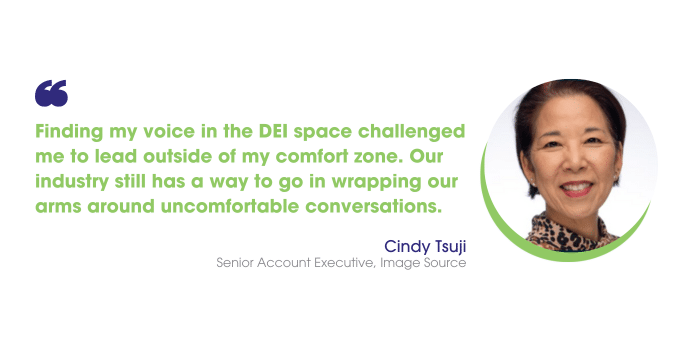
Product sourcing poses another challenge. While it’s true that the promo industry relies heavily on imports from China and other countries in Asia, buyers often assume that all branded merchandise is sourced overseas.
“A lot of times when customers find out that I’m from Hong Kong and speak Cantonese and Mandarin, they assume that all of the promo items from our company are manufactured and decorated in China,” says Swire Ho, director of sales and marketing at Garuda Promo and Branding Solutions, a California-based distributor.
“We also do have a lot of made-in-USA options,” he says, “and as a company, we have sought out options that are made locally (around Los Angeles) by a small business.”
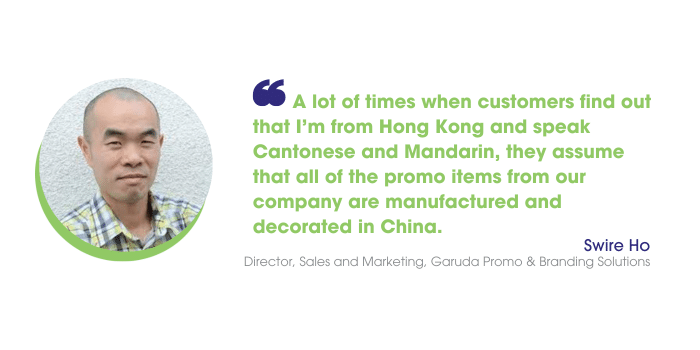
Kathy Cheng, owner and president of Toronto-based Redwood Classics Apparel, says this same assumption has been especially challenging as an apparel supplier. The company takes pride in being the opposite of fast fashion, producing its garments in Canada.
“Because of the color of my skin, people would just assume that we were made offshore,” Cheng says, “and we’d have to constantly explain that all our operations, cut and sew, even 70% of the fabric we consumed prior to COVID was knitted within a hundred-mile radius of us.”
Some buyers simply won’t accept goods manufactured in China, says Michelle Chen, president of Fossa Apparel, a family-owned apparel supplier with operations in California and China.
“This often places us in a challenging position, especially as importers with familial ties to our factory in China,” she says. “However, we must acknowledge that there are certain obstacles beyond our control and focus on highlighting the advantages of the vertical, direct manufacturing aspect of our business, which offers tremendous benefits.”
On the other hand, Cheng says buyers and end users increasingly insist on diversity and inclusion, which will help move things forward. “When you have 97% of Fortune 500 companies that have some sort of diversity program, that’s a real message that our industry as a whole should be listening to,” she says.
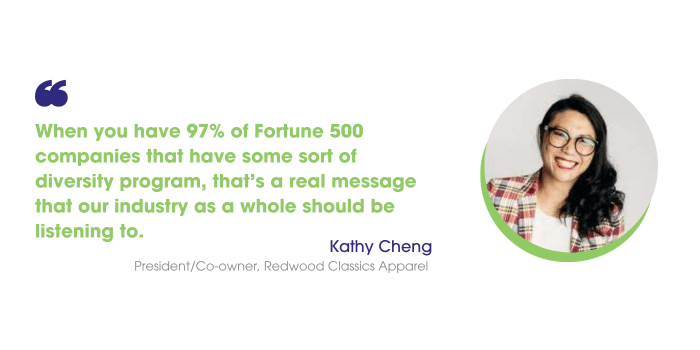
Strength In A Broader Perspective
While navigating the industry as a person of color comes with challenges, these promo pros also find strength in the values and skills instilled by their families and cultural backgrounds.
“Being a person from an Indian American background, I initially faced a crisis of identity in the beginning of my career almost 25 years ago,” says Sanjay Kotia, MAS, manager of product compliance and quality assurance for Utah-based supplier SnugZ USA. “However, in the promo industry for last decade, that notion of identity crisis turned into more of an identity establishment and recognition by the industry as a whole and by peers in particular.”
Kotia credits several teachings and skills from his heritage as contributing factors to his professional and personal success. “Among them are sense of responsibility, discipline, adaptability, time management and respect to others and showing gratitude to their ability and friendship,” he says. “I would keep integrity of character above all because it is the cornerstone of being honest, trustworthy, fair and having the moral courage to do the right thing.”
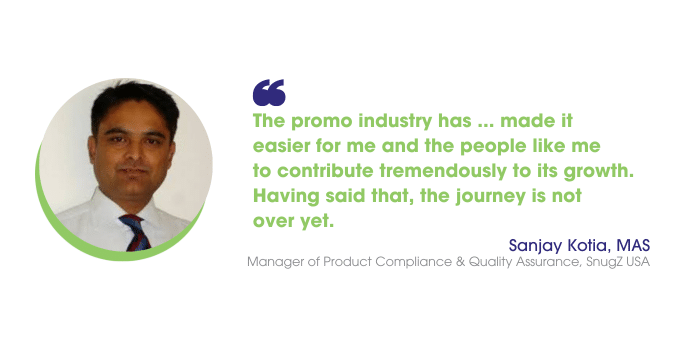
Ho, No. 14 on PPAI Media’s #Online18 individuals in 2023, was born and raised in Hong Kong and says the culture he absorbed there from a young age helps him succeed in sales today. “If you have ever been there, you will notice everyone power walks. People are always rushing to be somewhere,” he says. “… Time management was important, and we learned to prioritize.”
Like Kotia, Ho also prizes integrity. “I was taught from a very young age that integrity matters the most, even though sometimes having integrity will put you at a disadvantage,” Ho says. “I think this is what I learned from my family the most and kept to heart.”
Like Ho, Cheng is multilingual – she speaks English, French and Cantonese – and she says the ability to speak multiple languages keeps her open to new perspectives. “When we have a diverse perspective of situations and exposure, we can be more creative,” she says.
She also finds having an international perspective as an immigrant to be very valuable. “I’m very fortunate in the sense where as an immigrant and our traditional upbringing at home, I understand that Asian character and the cultural nuances,” she says. “However, because I was educated and I was brought up in North America, I can understand both perspectives.”
This global awareness proved especially helpful in the early days of COVID. Because of ties to China, Cheng and her employees were aware and able to prepare early on for what quickly became a global pandemic.
“We heard about this thing called COVID, and because we had experienced SARS years prior, we understood that,” she said, “so we were quarantining people, like our staff that was coming back from Asia, starting all the way in Q4 of 2019.”
Because masking had become a common practice in China almost 20 years prior, Cheng and her staff also understood the value of face masks before it was widespread in North America. They quickly turned to making masks, both selling and donating them. “I think that’s a great example where having multiple cultures allowed us to really step up and give back to our North American community,” Cheng says.
Embracing Diversity And Working Together
That’s just one of the ways these promo pros have turned obstacles into opportunities. While all say things have improved, they also agree that we still have work to do when it comes to diversity, equity and inclusion in the industry.
RELATED: PPAI Diversity, Equity and Inclusion Resources
“Over the years, the promo industry has grown so much, as well as embarked upon recruiting talented people from diverse backgrounds, and therefore, made it easier for me and the people like me to contribute tremendously to its growth,” says Kotia. “Having said that, the journey is not over yet – the challenging chapter of that journey is just beginning, and a long path ahead for all of us to travel.”
Newcomers to the industry, especially people of color, may find it lonely at times. Tsuji says don’t let that deter you. “Find a mentor that can be an advocate and coach for you to navigate the industry,” she says. “Find your voice and use it to speak up in the rooms where no one looks like you. Your perspective is valuable and worthy to be heard.”
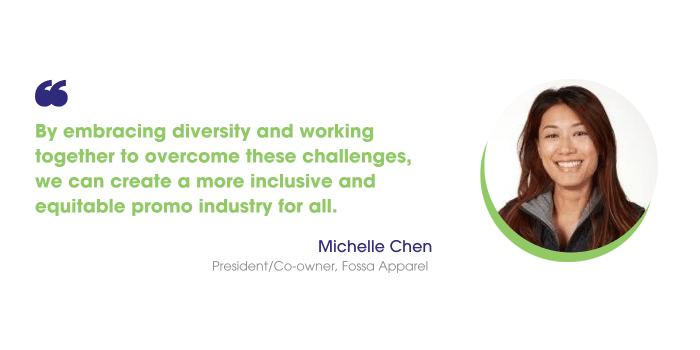
Cheng says it’s also important to make space for others, especially if you’re already established in the business. “I think it’s our responsibility to create a safe space for others so that they can be the best versions of themselves,” she says. “… And you have to lift others up along with you. If you found your voice, please use it to open up the pathways for others that may not feel as comfortable using their voice.”
Chen, who currently serves on PPAI’s DEI Task Force, says it’s crucial to address these hurdles by fostering inclusivity, advocating for representation and promoting cultural understanding within the industry. “By embracing diversity and working together to overcome these challenges,” she adds, “we can create a more inclusive and equitable promo industry for all.”


